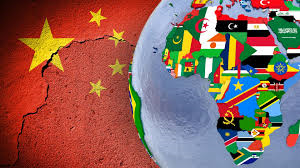FOCUS ON AFRICA-CHINA FRIENDSHIP=Could China's growing military presence and security cooperation in Africa lead to increased tensions between global powers on the continent, such as the U.S. and the EU? By Hugo Keji

China's growing military presence and security cooperation in Africa could potentially lead to increased tensions between global powers like the U.S. and the EU.
Here's why:
1. Strategic Interests in Africa
- China's Approach: China’s military engagement in Africa is part of a broader strategic expansion. China has historically focused on economic and infrastructure investments in Africa, but in recent years, it has increased its military footprint, notably by establishing its first overseas military base in Djibouti in 2017. Its involvement in peacekeeping operations, counter-piracy efforts, and military training programs has been steadily growing.
- U.S. and EU Response: The U.S. and EU have long-standing military and strategic interests in Africa, including counterterrorism efforts, military aid, and peacekeeping operations. China’s growing influence could be seen as a challenge to Western dominance in the region, particularly in areas of security and military cooperation.
2. Resource Competition
- Africa is rich in natural resources like oil, minerals, and rare earth metals, which are essential for global supply chains. China’s military presence can be viewed as a way to safeguard its economic investments and secure access to these resources, which may intensify competition with the U.S. and the EU. As these powers also vie for access, tensions could increase over control and influence in resource-rich regions.
3. Differing Strategic Models
- China: China’s strategy in Africa often emphasizes non-interference in the internal affairs of African nations, which contrasts with the U.S. and EU's approach that tends to tie military or security cooperation with governance, human rights, and democratic reforms.
- Tensions Over Influence: This difference could lead to friction as African nations may choose between these competing models, aligning with China for security support without political conditions or with Western powers, which may have stricter governance-related requirements.
AfriPrime App link: FREE to download...
https://www.amazon.com/Africircle-AfriPrime/dp/B0D2M3F2JT
4. Military Presence and Naval Power
- China’s growing naval power and its interests in securing sea lanes near critical chokepoints like the Horn of Africa raise concerns for Western powers. Both the U.S. and EU rely on these maritime routes for global trade and military operations. If China strengthens its military presence around these areas, it could lead to strategic recalibrations, including potential confrontations over control and influence over key maritime routes.
5. Geopolitical Rivalries
- Africa has increasingly become a stage for geopolitical competition between global powers, and China’s military engagement adds a new layer to this. The U.S. has responded to China’s growing influence with programs like the "Prosper Africa" initiative, aimed at countering China’s Belt and Road Initiative (BRI). Security and military cooperation could become a central point of rivalry, with each power seeking to outmaneuver the other in terms of alliances and influence over African governments.
6. Potential for Proxy Conflicts
- As major powers seek to expand their influence in Africa, there is a risk of proxy conflicts emerging. While Africa has largely avoided being a battleground for global power rivalries in recent years, the increased militarization and divergent interests of China, the U.S., and the EU could make it a flashpoint for future conflicts, either directly or through local actors supported by these powers.
7. Diplomatic Relations and Partnerships
- African nations might leverage the competition between these powers to their advantage, but this balancing act could also create diplomatic frictions. Countries that align more closely with China for security cooperation might face pressure from Western nations, potentially complicating international partnerships and aid relations.
Conclusion
China’s expanding military presence and security cooperation in Africa are likely to reshape the geopolitical dynamics on the continent. While Africa has long been an arena for economic competition among global powers, the military dimension introduces a new element that could heighten tensions between China and Western powers like the U.S. and the EU. The competition for influence, control of resources, and strategic maritime routes may lead to increased friction, and possibly conflicts, as these powers jockey for dominance in Africa.
AfriPrime App link: FREE to download...
- Questions and Answers
- Opinion
- Motivational and Inspiring Story
- Technology
- Live and Let live
- Focus
- Geopolitics
- Military-Arms/Equipment
- Segurança
- Economy
- Beasts of Nations
- Machine Tools-The “Mother Industry”
- Art
- Causes
- Crafts
- Dance
- Drinks
- Film/Movie
- Fitness
- Food
- Jogos
- Gardening
- Health
- Início
- Literature
- Music
- Networking
- Outro
- Party
- Religion
- Shopping
- Sports
- Theater
- Health and Wellness
- News
- Culture

